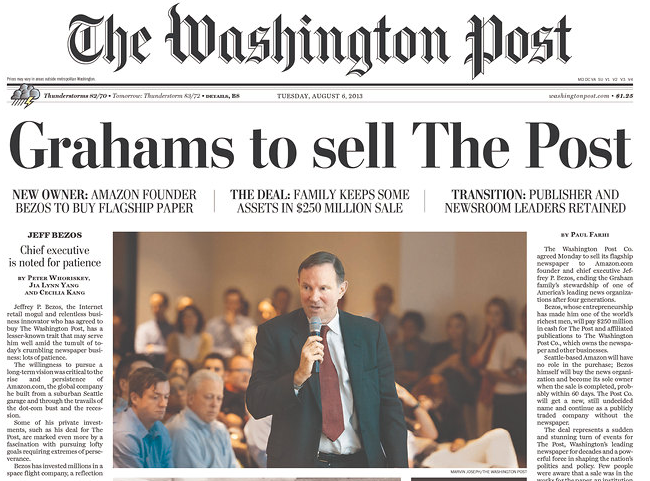You’d think a newspaper would be the last business in need of disruption. Yet Jeff Bezos, whose Amazon.com is the most disruptive force in retailing and perhaps in all of American business, has just plunked down $250 million of his own money to that The Washington Post, off the hands of the Graham family and the other shareholders of the soon-to-be renamed Washington Post Co.
I’m not going to pretend to know why Bezos did this. Maybe he has some never before expressed desire to be a press lord. Perhaps he had a secret desire to save the Post from the death by a thousand cuts it as suffering. Or maybe, just maybe, he has some notion of how to turn the slowly sinking Post back into a viable business.
National ambition, local reality. The Post has always been a somewhat odd beast. It’s basically a local paper with national ambitions but without the means to realize them. The Post, unlike the Times, never committed the resources needed to go national. At the same time, local news coverage always took a back seat (and it was something like the back seat of a Porsche) to the all-powerful National Desk. The Post tended to regard Washington’s suburbs as foreign territory and showed only a fitful interest in the less-prosperous neighborhoods of the District of Columbia.
Lack of attention to the community is likely one reason the Post failed to derive any benefit from the rapid growth of the Washington metropolitan area. Between 1990 and 2010, the Post‘s circulation fell faster than the Times’ even though Washington was growing much faster than New York.[pullquote]Between 1990 and 2010, the Post‘s circulation fell faster than the Times’ even though Washington was growing much faster than New York.[/pullquote]
Disruption can sometimes bring renewal, but the Post has only seen pain and decline. When the collapse of classified ads and the disappearance of department stores clobbered ad revenues, the Post responded in the worst possible way, by gutting the paper. Successive rounds of buyouts gradually deprived the staff of many of its most talented writers, reporters, and editors (If you leave the choice of who gets bought out to the staff, as the Post largely did, you are going to lose your best people.)
Shrinking news. The news hole shrank drastically, the business section disappeared (taking most tech coverage with it), domestic bureaus were shuttered, and arts and cultural coverage was savaged. For reasons that I cannot explain even to myself, I get three dead tree newspapers, the Post, the Times, and The Wall Street Journal delivered, but I am hard-pressed these days to spend more than five minutes on the Post each morning. It is still capable of occasional greatness, but mostly it is a pale shadow of itself.
Until recently, the Post‘s online efforts have also been pathetic. The online Post was originally established as completely separate operation from the regular newsroom, in part to keep the online staff out of Newspaper Guild jurisdiction. Whatever that saved, it was a disastrous decision. The “real” Post staff regarded the online folks as an even lower life form than the Metro staff. While the Times and Journal built their online operations into real businesses, the Post moldered. It has since taken aggressive steps to remedy this, but it is very, very late.
So Bezos has bought himself a badly tarnished, once-great, newspaper. What is he going to do with it? I hope he will at least stem its decline. If the Post‘s finances stabilize, as they have shown some recent signs of doing (and the Washington Post Company is retaining legacy pension costs), Bezos can afford to absorb the current level of losses for many years to come. Even better, maybe he can find some Amazon magic to revive the Post.

Very informative for an overseas reader, thanks! I wonder if there is some way in which being a gutted, once-great, news-paper makes it precisely the right asset for Bezos.
If any industry needs a successful disruption, it is the newspaper industry. I wish Bezos the best.
Joe
I appreciate you sharing this blog.Really looking forward to read more. Really Great.